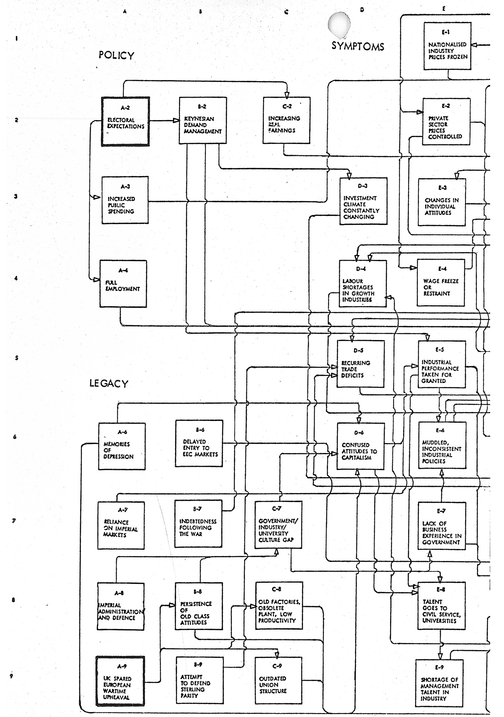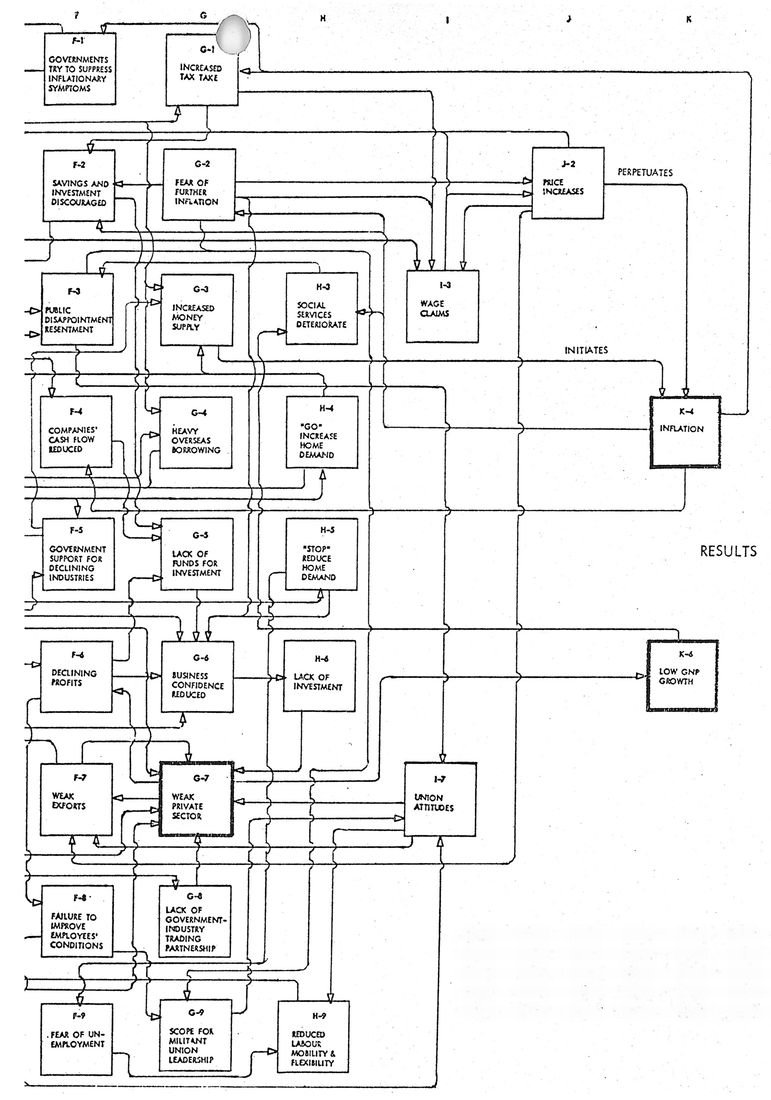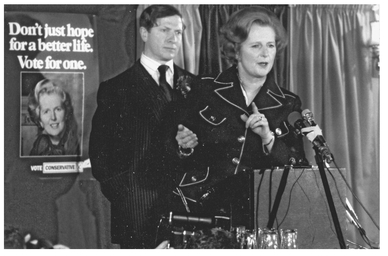Read There is No Alternative Online
Authors: Claire Berlinski
There is No Alternative (11 page)
In his efforts to delineate the constituent parts of the sickness, Hoskyns produced what has come to be called the wiring diagram, a labyrinthine pictorial description of the British Disease
(overleaf)
.
(overleaf)
.
This is not, I think you will agree, the work of a man who fails to see that life is complicated.
Having constructed the diagram, Hoskyns concluded that Britain's postwar settlement had produced an entirely dysfunctional economy and society. It would have to be completely rewired. In other words, Britain needed a revolution. For a revolution, you need fervor. In “Stepping Stones,” he supplied the vocabulary with which to rouse that fervor.
Events continue to reveal the true morality of collectivism.
But the real pointâthat socialism is
less
moral than capitalism, rather than
as
immoralâhas not been made.
35
[
Emphasis in original
]
less
moral than capitalism, rather than
as
immoralâhas not been made.
35
[
Emphasis in original
]
Â
Reproduced with John Hoskyns's kind permission.

Â
A VIEW OF THE UK ECONOMIC PROBLEM
As of 1 October 1974. John Hoskyns
As of 1 October 1974. John Hoskyns

How was that point to be made, precisely? He proposed that the electorate might be divided among “Doers,” “Thinkers,” and “Feelers.” Thatcher's message, he held, should be tailored to appeal to all three groups, but to all, one message would be repeated over and over:
Shame.
Shame.
TRIGGERING THE DOERS
We believe this should concentrate on people's place of work . . . This is the behavior we wish to cause people to question. Are people really not
ashamed
that they enter into strike action which, they all know, has no concern whatsoever for their fellow humans, let alone workers? They must be
ashamed
but they do it because they are frightened and bewildered and because no political party has identified a society which can give them hope for the future and reason to behave as the science tells them they ought . . .
ashamed
that they enter into strike action which, they all know, has no concern whatsoever for their fellow humans, let alone workers? They must be
ashamed
but they do it because they are frightened and bewildered and because no political party has identified a society which can give them hope for the future and reason to behave as the science tells them they ought . . .
They know that there are massive hidden economies, i.e., fiddles and thefts that go on at work. Yet no one has made them feel
ashamed
of this, no one has pointed out that it would be far better if morality and integrity were reintroduced into society so that all could
hold their heads up with pride
. . .
36
[
My emphasis
]
ashamed
of this, no one has pointed out that it would be far better if morality and integrity were reintroduced into society so that all could
hold their heads up with pride
. . .
36
[
My emphasis
]
Thatcher, he advised, must demand that the electorate not merely change its government, but reject socialism root and branch.
To achieve this it is necessary to instill into the emotional majority (the “Feelers”) . . . a sense of
shame
and
disgust
with the corrupting effects of socialism and union powerâclass war, dishonesty, tax fiddling, intimidation, shoddy work
37
. . . [
My emphasis
]
shame
and
disgust
with the corrupting effects of socialism and union powerâclass war, dishonesty, tax fiddling, intimidation, shoddy work
37
. . . [
My emphasis
]
Â
Thatcher with Conservative politician Neil Thorne at the Ilford Conservative Club, presenting her case during the 1979 general election campaign. The journalist John Biffen once described the prime minister as “a tigress surrounded by hamsters.”
(Courtesy of Graham Wiltshire)
(Courtesy of Graham Wiltshire)

The Labour Party, argued Hoskyns, must be identified clearly with this shame:
To regain the initiative, we therefore have to explain to the Feelers that Labour really does stand for Clause 4 Socialism, and the dictatorship of unsackable union leaders; a partnership which has led to a “Sick Society” which is materially impoverished, dishonest, stupid, arbitrary, unfair, and finally
frightened; so that it is
pitied
, as
childish
and backward, rather than
respected
by other countries.
38
[
My emphasis
]
frightened; so that it is
pitied
, as
childish
and backward, rather than
respected
by other countries.
38
[
My emphasis
]
Above all, the voters must be made to understand the meaning of socialism:
Spell out Clause 4, printed on every party members' card . . . This is what they're determined to get, in the end. . . . The union-Labour link is unique to Britain; so socialism always has the real power, whatever people thought they had voted for. That is why we are now the most socialist, as well as the poorest country in the Western world except for Italy . . .
Socialismâand the Labour Partyâmust be shown to be inextricably linked with the overweening power of the trade unions:
In order to attack an adversary, one must first identify his weak points or Critical Links. For the Labour Party this is obviously their relationship with the unions . . . We must both attempt to defeat the Labour Government in its own right, and also the unions in their own right. If we succeed in bringing down one, we bring down both.
39
39
But the message must not, he repeated, be confined to promising people that they will be better off, economically, under the Tories. “
Morality
in the end counts for more than personalities; an
appropriate value system
counts for more than âcorrect' economic policy.”
40
My emphasis, again.
Morality
in the end counts for more than personalities; an
appropriate value system
counts for more than âcorrect' economic policy.”
40
My emphasis, again.
Stern stuff.

I meet John Hoskyns for lunch at the Travellers Club, the oldest of the gentlemen's clubs on Pall Mall. You might think, from the documents above, that Hoskyns would be rather a grim and self-righteous personality, but nothing could be farther from the truth. He is jolly and charming, quick to laugh, and touchingâgrandfatherly, almostâin his concern that I enjoy my meal and order the richest items on the menu. I order the Dover Sole, and to please him, the buttery mashed potatoes. Then we discuss the famous wiring diagram.
John Hoskyns:
What the diagram really said is that if you're going to change anything, you've got to change
everything.
Not because that sounds like a good,
Hurrah!
sort of thing to say, and we want to be revolutionaries, and we want to do big things, but because actually, in terms of logic, the causal connections are such that you cannot say, “Let's just do
that,”
becauseâyou can't! Because actually, there are five
other
things that are causing that.
What the diagram really said is that if you're going to change anything, you've got to change
everything.
Not because that sounds like a good,
Hurrah!
sort of thing to say, and we want to be revolutionaries, and we want to do big things, but because actually, in terms of logic, the causal connections are such that you cannot say, “Let's just do
that,”
becauseâyou can't! Because actually, there are five
other
things that are causing that.
[
Waitress interrupts
]
Waitress interrupts
]
Waitress:
Would you like to look at the dessert cart?
Would you like to look at the dessert cart?
JH:
What would you like? A large slice of chocolate cake?
What would you like? A large slice of chocolate cake?
CB:
I'll have a lookâ
I'll have a lookâ
Waitress:
We have a strawberry cheesecake, chocolate truffle cake, and then we have a trifle, and strawberries in red wine with orangeâ
We have a strawberry cheesecake, chocolate truffle cake, and then we have a trifle, and strawberries in red wine with orangeâ
CB:
I'll try a trifle.
I'll try a trifle.
JH:
There
we are! . . . I think the wiring diagram satisfied me, and I know I had to explain to Keith [Joseph], “This is not a magic gadget which tells us how to do it. What it does is it says, âAt last, we have an imperfect but very rough and ready picture of the problem, well, really, of the
answer
to the question,
why is this country such a mess?
'” And the answer goes right back to the end of the war, the challenges of the
peace, and the policy responses to those challenges . . . which with hindsight, very easy to make that mistake at the time, probably if one had been in his forties or fifties as a politician in those days, one would have done the same thing. One would have gone with the New Jerusalem. The Thatcher remedy started, I do think, with the wiring diagram. Then, the next step is you say, “Only a revolution will do any good.” And you don't have revolutions for fun, they're very uncomfortable, very unpleasant, a lot of people get hurt, andâ
You shall have a war.
It's going to be very unpleasant, and we're going to be hated, and the better the things we do, the more hated we will be. I remember all these thoughts were in my mind when I was working for her, and I thought, “We're not likely to bring it off. But if we do, she will be a historic figure.”
There
we are! . . . I think the wiring diagram satisfied me, and I know I had to explain to Keith [Joseph], “This is not a magic gadget which tells us how to do it. What it does is it says, âAt last, we have an imperfect but very rough and ready picture of the problem, well, really, of the
answer
to the question,
why is this country such a mess?
'” And the answer goes right back to the end of the war, the challenges of the
peace, and the policy responses to those challenges . . . which with hindsight, very easy to make that mistake at the time, probably if one had been in his forties or fifties as a politician in those days, one would have done the same thing. One would have gone with the New Jerusalem. The Thatcher remedy started, I do think, with the wiring diagram. Then, the next step is you say, “Only a revolution will do any good.” And you don't have revolutions for fun, they're very uncomfortable, very unpleasant, a lot of people get hurt, andâ
You shall have a war.
It's going to be very unpleasant, and we're going to be hated, and the better the things we do, the more hated we will be. I remember all these thoughts were in my mind when I was working for her, and I thought, “We're not likely to bring it off. But if we do, she will be a historic figure.”
CB:
When you first met her, did you sense any particular political charisma? Or was that something that only emerged later?
When you first met her, did you sense any particular political charisma? Or was that something that only emerged later?
JH:
[
Long silence
] I didn't particularly. I think that grew as time went on. I was interested, having already met her through Alfred Sherman [initially one of Thatcher's political advisors], a tough, rude, multilingual, seven-languages or something, brilliant East End Jew, built like a sort of 5'2” gorillaâ
lovely
man, very funny man, tooâabsolutely fearless, tremendous mental energyâand I thought, if she can realize what
he's
got to offer, compared with some of these Beta-minus, Beta-plus intellects in the Party machine, and doesn't safely settle for another public schoolboy, but takes this fellow instead, well thenâand that Keith and Margaret, those two people, could forge such an unlikely bond, and both listen to this completely from-outer-space
brainbox,
it did make me think, when I came to meet her, “She's not your ordinary, world-weary, pompous, self-important, thinking-inside-the-box, slightly defeatist, pragmatic, cautious, Tory
politician.” You know, she's
not.
She's actually realizing that something
terrible
has got to be done.
[
Long silence
] I didn't particularly. I think that grew as time went on. I was interested, having already met her through Alfred Sherman [initially one of Thatcher's political advisors], a tough, rude, multilingual, seven-languages or something, brilliant East End Jew, built like a sort of 5'2” gorillaâ
lovely
man, very funny man, tooâabsolutely fearless, tremendous mental energyâand I thought, if she can realize what
he's
got to offer, compared with some of these Beta-minus, Beta-plus intellects in the Party machine, and doesn't safely settle for another public schoolboy, but takes this fellow instead, well thenâand that Keith and Margaret, those two people, could forge such an unlikely bond, and both listen to this completely from-outer-space
brainbox,
it did make me think, when I came to meet her, “She's not your ordinary, world-weary, pompous, self-important, thinking-inside-the-box, slightly defeatist, pragmatic, cautious, Tory
politician.” You know, she's
not.
She's actually realizing that something
terrible
has got to be done.

Other books
The Adored by Tom Connolly
Expecting Jeeves by P. G. Wodehouse
As You Are by Ethan Day
Angel of Darkness by Cynthia Eden
New Year's Kiss by Tielle St Clare
Our Ecstatic Days by Erickson, Steve
Breath and Bones by Susann Cokal
Angel by Dani Wyatt
Forbidden Planets by Peter Crowther (Ed)
Lawful Escort by Tina Folsom

